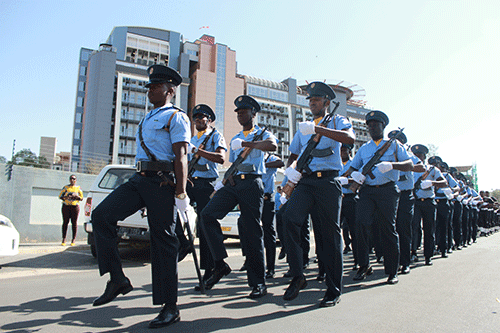The Namibian Police Force members are leaving in droves to pursue greener pastures, go on retirement and some active members have died, while many simply want to protect their pension from retirement funds.
The exact figures on the police staff compliment are highly classified for security reasons.
However, unconfirmed reports suggest the force operates at around 60% of its capacity.
The situation has led to internal sources lamenting the serious shortage that is causing the work of the force to suffer.
The last mass police recruitment was in 2019.
Three years down the line, new cadets have not been recruited due to budgetary constraints.
There is no plan to arrest the situation.
Outgoing police boss Sebastian Ndeitunga said recent years have taught the police to do more with less – even in crime prevention.
“There is no money. We have to prioritise which areas we need more members and take them there, depending on actual need. We can only do more with the little resources at our disposal,” Ndeitunga said last week.
“This is a sensitive security matter; therefore, we cannot share figures – but all in all, those who are retiring are being replaced” was police spokesperson Kauna Shikwambi’s response to detailed questions recently.
Many of the active officers joined the force in the early 1990s.
They are now leaving en masse as they head into retirement.
What is more is there is no clear plan to replace them in the absence of a requisite budget.
Asked about the police’s plan to fill vacancies in the face of ever-dwindling financial resources, Shikwambi said: “All vacant positions are filled in line with the existing structure and establishment of the Namibian Police Force – and, in this regard, experienced, able, willing and capable members of the force are promoted and appointed in those positions”.
Shikwambi could also not say how many members have left the force in the past five years – either due to retirement, early expulsion, resignation or deaths.
The draft regulations by the Namibia Financial Institutions Supervisory Authority (Namfisa) proposing a 75% pension preservation have not helped either.
Through the proposal, members of retirement funds will be required to preserve at least three quarters of their minimum individual reserve (fund credit) until the age of 55.
The proposal has caused consternation in the force, with many members leaving the force to access their pension before this right is taken away, New Era has been reliably informed.
As a result of a public outcry, Namfisa recently announced the Financial Institutions and Markets Act 2021 (FIMA) would not come into operation on 1 October 2022 as it was previously envisaged.
However, Nampol maintains it has a succession plan in place to ensure there is no leadership vacuum.
“NamPol’s plan is inclusive trainings, mentoring and coaching, inductions as well as skills transfer,” she said.
Recent times have also seen female police officers taking up high-ranking positions in the hierarchy.
For the first time, a female candidate could replace Ndeitunga as the new inspector general when he steps down at the end of August.
She is Anne-Marie Nainda, the deputy inspector general for administration.
Shikwambi said this is not coincidental.
She said through the adoption and implementation of the national gender policy, policing has been made easier for women to be represented at all levels.
“It must be known that all members of the Namibian Police Force, who have grown in ranks and structure, have proven themselves to be hardworking, knowledgeable and capable to lead in the positions that are accorded to them; women in uniform are no exception,” Shikwambi stressed.
Significant strides were made in the process.
“Women have proven themselves. Women are experienced, able and willing to serve, academically qualified, while others are still pursuing their qualifications, thus advancing in all spheres and, therefore, must be given the recognition they dully deserve.”



